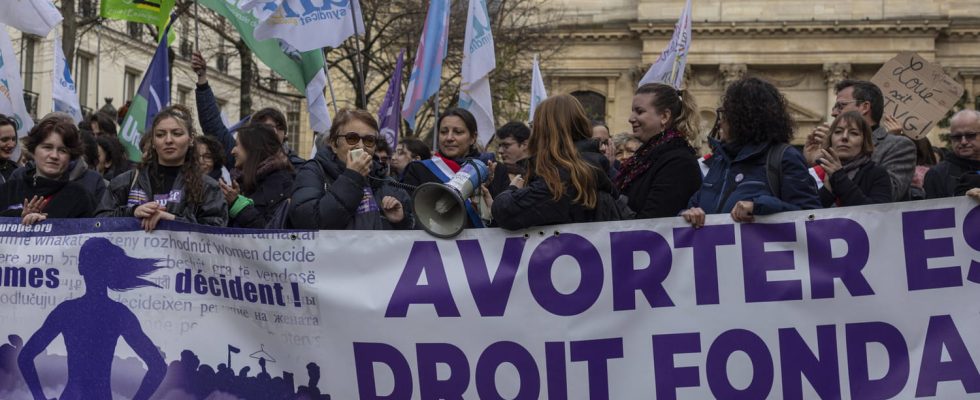The inclusion of the “guaranteed freedom” to resort to abortion in the Constitution creates a right subject to cumbersome obstacles.
With the constitutional revision, the first under the mandates ofEmmanuel Macron, France becomes the first country to include the freedom for women to have abortion in the Constitution and to protect the right to abortion which is declining in certain countries, notably in Europe or the United States. However, in fact, despite a potential inclusion in the Constitution, access toIVG in France turns out to be unequal and faced with certain obstacles.
Significant geographic disparities in access to abortion
In France, the number of abortions is increasing over one year. In 2022, 234,300 voluntary terminations of pregnancies were recorded, i.e. 17,000 more than in 2021 according to figures from the Department of Research, Studies, Evaluation and Statistics (Drees). Until 2005, only hospitals and clinics were authorized to carry them out. From now on, they can be carried out in health or family planning and education centers as well as in city offices with a general practitioner or a gynecologist. On the other hand, access to abortion remains fragile for some, even in the event of a favorable vote by parliamentarians.
IVG faces significant geographical disparities. In certain departments, the infrastructures “are not up to par” deplores a parliamentary report of 2020. A factor which extends consultation times and travel time for women. In Ain, 48.3% of abortions are carried out outside the patients’ department of residence according to the Drees. This is the department most affected by this phenomenon in France.
Outside the mainland, the trend is confirmed: “We have a very large territory and a large part of it is rural. When we look at the list of practitioners, there is a strong concentration in the mainland”, regrets Annie Carraretto, president of Family Planning in the columns of franceinfo. The closure of establishments practicing abortions does not help anything, The world estimates at 45 the number of hospital establishments practicing abortion having closed between 2007 and 2017. Add to this the drop in the number of maternity wards opened in France between 1996 and 2019, from 814 to 461 according to the Drees, and you obtain a drop drastic increase in the number of abortion centers in public hospitals.
The question of the conscience clause
“The doctor who does not want to (perform an abortion) will obviously have the right and the freedom not to want to. We are not going to violate consciences. And that is already guaranteed by the Constitution.” These were the words of the Minister of Justice, Eric Dupond-Moretti, this Sunday on Radio J. As a reminder, according to the code of ethics of doctors, except in cases of vital emergency, any practitioner “has the right to refuse care for professional or personal reasons”, this is the double clause of conscience. Within the framework of the public health code, a doctor “is never required to carry out a voluntary termination of pregnancy, but he must inform, without delay, the person concerned of his refusal”. In other words, a doctor can refuse to perform an abortion, a clause introduced by the Veil law.
For their part, feminist associations are fighting for the removal of such a clause which, for them, would be a barrier to access to abortion for women. This is why the Minister of Justice was keen to clarify the executive’s position on the issue and to defuse any fire in a historic moment for women’s rights, particularly towards the medical profession. For him, the inclusion of abortion in the Constitution, if this is the case, “absolutely does not render” the conscience clause of health professionals obsolete. “There is no fear, neither for doctors nor for midwives. We are dealing with societal issues and we must respect the convictions of each person” he recalled. The order of doctors such as the National College of Gynecologists and Obstetricians is also opposed to the removal of this conscience clause because “it protects the woman, by imposing an obligation to redirect her towards a practitioner or a health establishment practicing abortion” he indicates to Le Monde.
A lack of specialized personnel
Added to these obstacles is the lack of doctors and health professionals who practice voluntary termination of pregnancy in France. According to parliamentary report of 2020 led by Marie-Noëlle Battistel and Cécile Muschotti, the abortions carried out in the city were carried out by 1,932 approved practitioners. Which represents 2.9% of general practitioners and gynecologists and 3.5% of midwives. Clearly, the practice of this act relies on the skills of a handful of practitioners “many of whom are soon to retire,” warns the report.
Figures offset by the meteoric rise in medical abortion in the city or by aspiration in health centers, in particular thanks to private midwives. According to figures from the Drees, the balance of power has completely reversed between medical and instrumental abortion. The share of medical abortions increased from 30.6% to 78.5% between 2001 and 2022. At the same time, that of instrumental abortions collapsed over the same period, going from 69.4% to 21, 5%.
